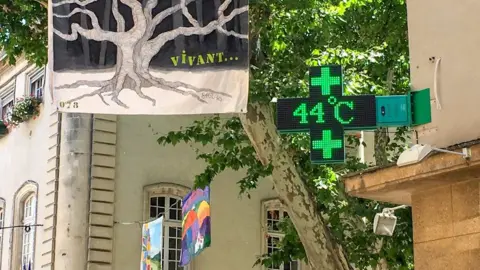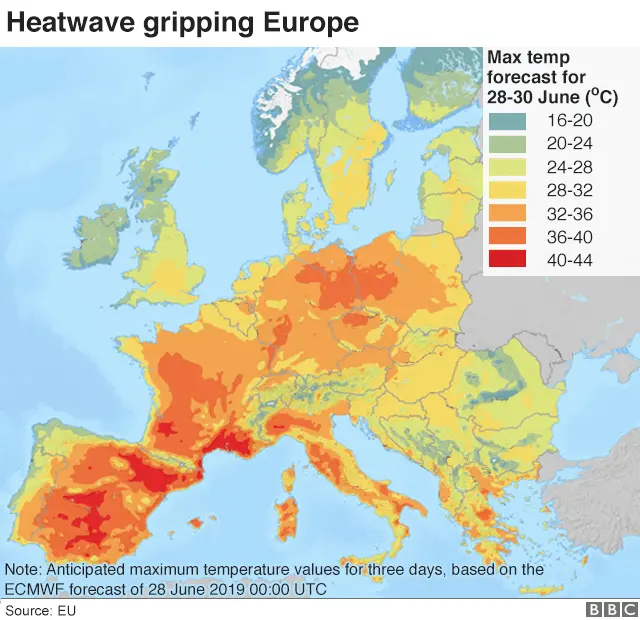European heatwave: France hits record temperature of 45.9C
 AFP
AFPFrance has hit its highest recorded temperature - 45.9C (114.6F) - amid a heatwave in Europe that has claimed several lives.
The new record was measured in the southern village of Gallargues-le-Montueux. Before this year the previous record was 44.1C during a heatwave in 2003 that killed thousands.
Health Minister Agnès Buzyn warned that "everyone is at risk".
France's weather service has issued an unprecedented red alert for four areas.
Those are all in the south, but most of the country remains on orange alert, the second-highest level.
Meteorologists say hot air drawn in from northern Africa is responsible, caused by high pressure over central Europe and a storm stalling over the Atlantic.
In Gallargues-le-Montueux, Mayor Freddy Cerda said the record was something the village had to "put up with".
"We have to put up with this climate, and that's what the future holds for us, don't forget. The south of France is going to become tropical," he said.
Hundreds of schools were closed on Friday and water restrictions were in place.
Meteorologist Etienne Kapikian tweeted a map showing temperatures had risen above 40C for much of southern France.
Allow X content?

The French weather service said temperatures of between 37C and 41C were expected across most of France on Saturday.
Swaths of the continent are experiencing extreme heat. Germany, France, Poland and the Czech Republic have all recorded their highest-ever June temperatures.
 AFP
AFPIn Spain firefighters have been battling Catalonia's worst wildfires in 20 years. Eight provinces are on red alert while temperatures are expected to rise above 42C in many areas.
The Italian ministry of health has reported emergency levels of heat in 16 cities.
Loss of life
Several people are believed to have lost their lives as a result of the extreme temperatures, including two who died from suspected heatstroke in Spain.
One, a 17-year-old farm worker in Córdoba, went into convulsions after cooling down in the farm swimming pool, while an 80-year-old man died on a street in the northern city of Valladolid.


In France, Prime Minister Edouard Philippe said a drowning was taking place every day and warned that the heat was making people "take risks".
On Thursday a 33-year-old roofer died after being taken ill as he worked on a building site in the western city of Rennes, where the temperature was 35C in the shade.
A six-year-old Syrian child was also in a serious condition after being thrown into the air by the force of a water jet from a fire hydrant that had been opened by residents in Saint Denis, north of Paris.
Ms Buzyn urged the public to avoid "risky behaviour" like leaving children in cars or jogging outside in the middle of the day.
In the UK, police warned people of the dangers of cooling off in rivers and lakes after a 12-year-old girl drowned in the River Irwell in Greater Manchester.
Is climate change to blame?
Linking a single event to global warming is complicated.
While extreme weather events like heatwaves occur naturally, experts say these will happen more often because of climate change.
Records going back to the late 19th Century show that the average temperature of the Earth's surface has increased by about one degree since industrialisation.
A climatology institute in Potsdam, Germany, says Europe's five hottest summers since 1500 have all been in the 21st Century.
Scientists are concerned that rapid warming linked to use of fossil fuels has serious implications for the stability of the planet's climate.
